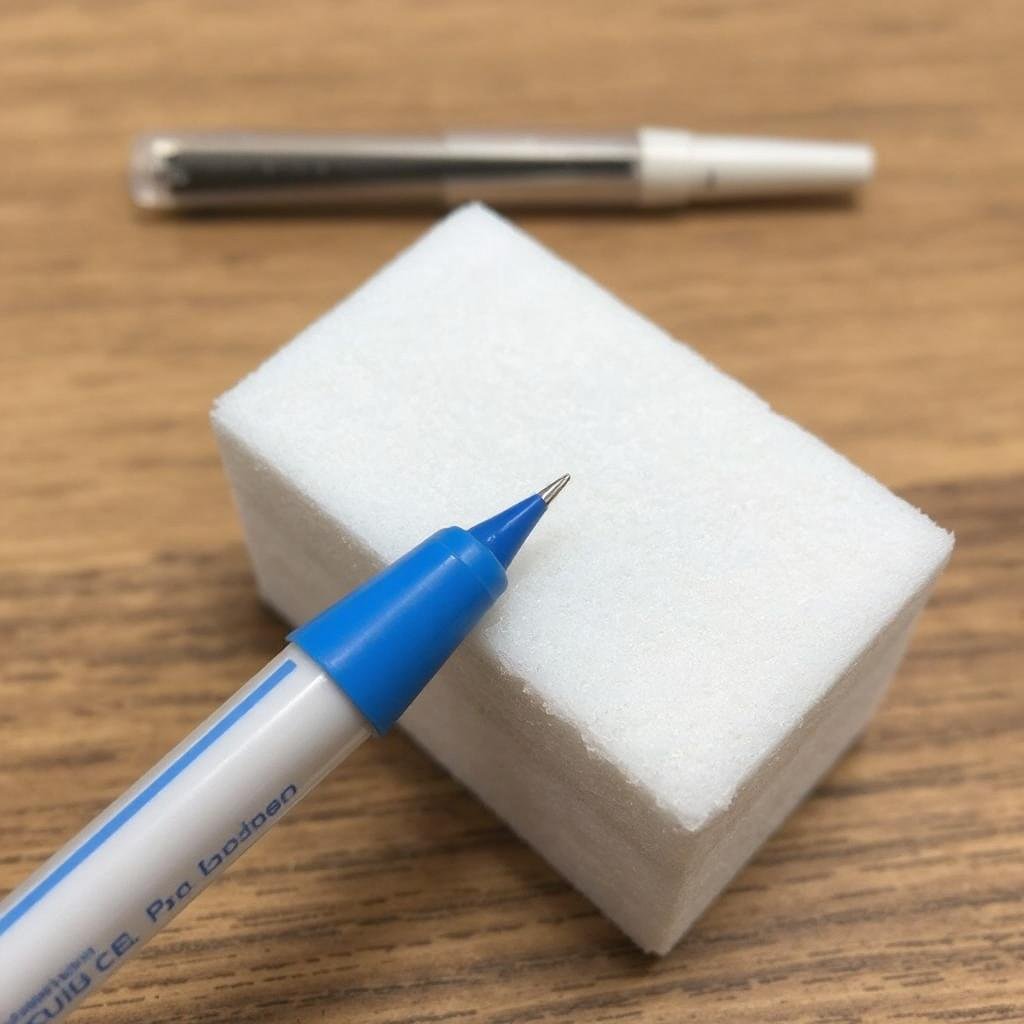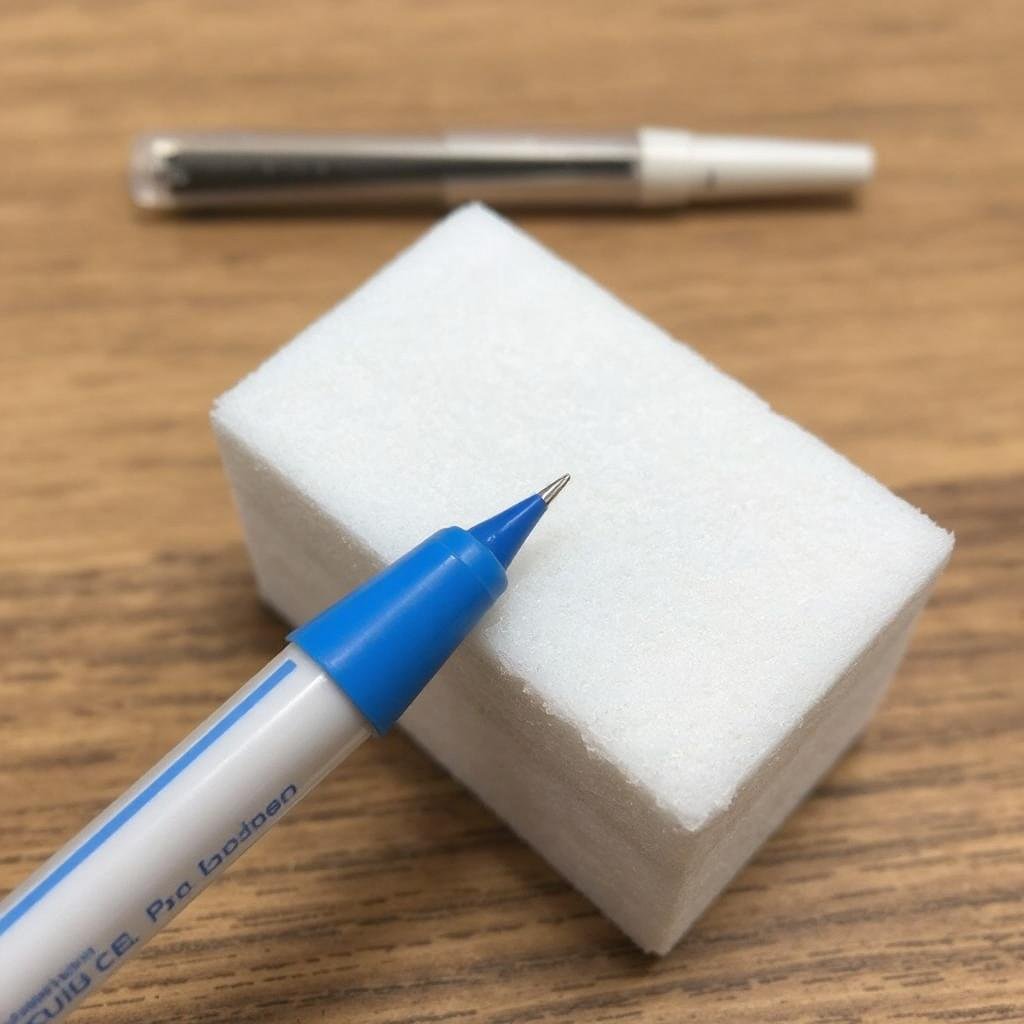
EVA foam, short for Ethylene-Vinyl Acetate, is a versatile material commonly used in crafts, cosplay, DIY projects, and even industrial applications. Its lightweight, flexible, and durable nature makes it an ideal choice for creating props, costumes, and protective gear. However, when it comes to writing or drawing on EVA foam, choosing the right pen can be challenging. The question often arises: “What pen to use on EVA foam?”
This comprehensive guide will explore the best pen options, key considerations, and tips to achieve clean, durable markings on EVA foam.

Find What Pen to Use on EVA Foam
Key Considerations When Choosing a Pen for EVA Foam
Understanding the properties of EVA foam is essential when selecting the right pen. Its slightly textured, non-porous surface can affect ink adhesion and durability. Here are the key factors to consider:
1. Ink Type
- Permanent Markers:
Pens with permanent, oil-based, or solvent-based inks are preferred for EVA foam. These inks are resistant to smudging, fading, and moisture, providing long-lasting results. - Avoid Water-Based Inks:
Water-based inks tend to bleed, smear, or fail to adhere properly, especially in humid conditions or when the foam is handled frequently.
2. Tip Size
- Fine-Tip Markers:
Suitable for detailed work, lettering, and intricate designs. Fine tips allow for precision, making them ideal for cosplay detailing and small projects. - Broad-Tip Markers:
Better suited for larger areas, bold markings, or quick coverage. These are useful when labeling large pieces of foam or creating thick outlines.
3. Durability
Pens with durable tips can withstand the pressure required to write on EVA foam’s textured surface without fraying or breaking.
4. Adhesion
The ink should bond well with the foam surface without rubbing off easily. Oil-based or solvent-based inks typically offer better adhesion compared to water-based alternatives.
5. Visibility
Consider the color contrast between the ink and the foam. Light-colored foams work well with dark inks, while darker foams require bright, opaque inks for visibility.
Best Pen Options for Writing on EVA Foam
Several pens are known for their effectiveness on EVA foam. The following options are widely used by crafters, cosplayers, and DIY enthusiasts.

Find What Pen to Use on EVA Foam
Comparison Table: Best Pens for EVA Foam
| Pen Type | Pros | Cons | Best For |
|---|---|---|---|
| Sharpie Permanent Markers | Affordable, widely available, durable ink | Some colors may not show well on light-colored foam | General labeling, basic designs |
| Uni-Ball Paint Markers | Smooth application, vibrant colors, good adhesion | Slightly more expensive than Sharpies | Detailed artwork, vibrant designs |
| Acrylic Paint Pens | Wide color range, suitable for artistic applications | Requires longer drying time | Artistic projects, custom designs |
| Posca Paint Markers | Excellent opacity, vibrant colors, versatile on multiple surfaces | Higher cost compared to other markers | Professional projects, detailed work |
| Molotow Liquid Chrome | High-gloss metallic finish, smooth flow | Expensive, may smudge if not fully dry | Metallic effects, highlights |
| Pilot Super Color Marker | Strong adhesion, water-resistant, suitable for various surfaces | Limited color options | Industrial markings, bold lines |
Detailed Reviews of Recommended Pens
1. Sharpie Permanent Markers
Pros:
- Readily available and affordable
- Comes in various colors and tip sizes
- Dries quickly and resists water
Cons:
- Limited vibrancy on light-colored EVA foam
- May fade slightly over time under UV exposure
Best Use: General labeling, outlines, and quick markings on dark-colored EVA foam.
2. Uni-Ball Paint Markers
Pros:
- Vibrant colors with smooth ink flow
- Excellent for detailed artwork
- Strong adhesion on EVA foam surfaces
Cons:
- Slightly higher cost than regular markers
- Requires proper shaking before use to mix the paint
Best Use: Fine details, decorative designs, and professional finishes on cosplay props.
3. Acrylic Paint Pens
Pros:
- Wide range of vibrant colors
- Suitable for layered artistic effects
- Water-resistant when dry
Cons:
- Longer drying time
- May require sealing for durability
Best Use: Artistic projects, custom designs, and colorful illustrations on EVA foam.
4. Posca Paint Markers
Pros:
- Excellent opacity, even on dark EVA foam
- Water-based paint but highly durable when dry
- Suitable for multiple surfaces, including foam
Cons:
- Higher price compared to other markers
- Needs occasional shaking to maintain consistency
Best Use: Professional-grade projects, detailed artwork, and vibrant color applications.
5. Molotow Liquid Chrome Markers
Pros:
- Metallic chrome finish for reflective effects
- Smooth ink flow for precision detailing
Cons:
- Expensive compared to standard markers
- Smudges easily if not given sufficient drying time
Best Use: Adding metallic details, highlights, and reflective effects on props.
Tips for Writing on EVA Foam
Achieving clean, professional-looking markings on EVA foam requires proper preparation and technique. Here are some practical tips:
- Test on a Scrap Piece:
Always test your pen on a scrap piece of EVA foam to check ink adhesion, drying time, and color contrast. - Apply Even Pressure:
Maintain steady, even pressure when writing to avoid inconsistent lines or smudges. - Allow Sufficient Drying Time:
Let the ink dry completely before handling the foam, especially when using paint markers. - Consider Using a Stencil:
For precise, intricate designs, use stencils to guide your markings and reduce errors. - Seal the Ink for Durability:
For long-lasting results, especially on frequently handled projects, consider sealing the ink with a clear acrylic spray.

Find What Pen to Use on EVA Foam
Examples of Applications
Cosplay Armor Detailing:
Cosplayers often use Posca or Uni-Ball paint markers to add weathering effects, intricate patterns, and highlights to EVA foam armor.
DIY Craft Projects:
For labeling storage boxes made of EVA foam, Sharpie permanent markers provide quick, durable results.
Industrial Use:
Pilot Super Color Markers are preferred in industrial settings for bold, clear markings on EVA foam used as packaging or insulation.
Common Mistakes to Avoid
- Using Water-Based Markers:
These can bleed or smear, leading to messy results. - Skipping the Test Patch:
Without testing first, you risk ink bleeding or poor adhesion. - Not Allowing Enough Drying Time:
Handling the foam too soon can result in smudged markings.
Frequently Asked Questions (FAQ)
1. Can regular pens be used on EVA foam?
Regular ballpoint pens generally do not adhere well to EVA foam and may result in faint or inconsistent lines.
2. How do you prevent ink from smudging on EVA foam?
Allow the ink to dry completely, and consider applying a clear sealant for added protection.
3. Are paint markers safe for children’s EVA foam projects?
Water-based paint markers like Posca are non-toxic and safe for children, but adult supervision is recommended.
4. Can EVA foam be painted instead of marked with pens?
Yes, EVA foam can be painted using acrylic or flexible spray paints, but for detailed work, markers are often preferred.

Find What Pen to Use on EVA Foam
Conclusion
When answering the question, “What pen to use on EVA foam?” several factors come into play, including ink type, tip size, durability, and visibility. Permanent markers, paint pens, and specialized craft markers like Posca and Uni-Ball are excellent choices depending on your project’s needs.
By considering the tips and pen options outlined in this guide, clean, vibrant, and long-lasting designs can be achieved on EVA foam for any project, from cosplay props to industrial applications.